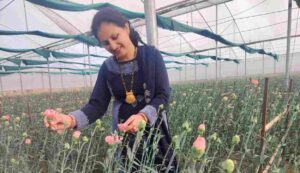Success Story: Know how Meena Chandel built a business of Rs 70 lakh from flower farming
Success Story: Meena Chandel, a native of Himachal Pradesh’s charming Bilaspur area, has retold her life narrative in the most motivational manner. She went from being a committed schoolteacher for more than ten years to a thriving profession in floriculture, where she and her husband established a profitable cut flower company. Their business now generates an astounding Rs 70 lakhs in revenue annually. Meena is a brilliant illustration of the enormous potential that women have in the agro industry.

Her incredible path serves as an inspiration to many people who want to transition from traditional occupations to agriculture as she joins the Global Farmer Business Network (GFBN).
A Fresh Start Stemming from Assistance
Meena Chandel taught high school in her hometown of Bilaspur for 12 years, molding young brains. Her career was stable, safe, and well-respected. However, when she saw her husband’s increasing interest in floriculture, she had a strong desire to be a part of something similarly rewarding, something that would bring her closer to the land, the seasons, and the abundance of nature.
In 2015, Meena made the decision to quit teaching because of her husband’s support and obvious love for flower gardening. Although it was a difficult choice, she has no regrets about it. “I realized how agriculture, especially floriculture, can offer both personal and professional satisfaction after watching my husband nurture plants and create something so beautiful and sustainable,” Meena says.
Establishing a Floral Business
In the present day, Meena and her spouse co-manage a thriving floriculture business spanning 22 bighas of land. One of their main operations is a cutting-edge greenhouse complex that spans more than 11,000 square meters. They grow a variety of in-demand flowers in these regulated settings, such as roses, dianthus, gypsophila, gerbera, lisianthus, and many carnation varieties, such as spray and limonium.
Their farm serves as a demonstration of market-oriented farming and strategic planning in addition to being a source of revenue. Every year, the flowers are planted from June to July, following a timetable that is precisely matched with consumer demand, which is at its highest during the winter wedding season. High returns are guaranteed because of the careful preparation that makes sure their flowers arrive to Delhi’s and other major Indian cities’ marketplaces just in time for the busiest celebrations.
Obstacles in the Face of Achievement
Notwithstanding their achievements, there have been challenges along the way. Because of its location in the foothills of Himachal Pradesh, Bilaspur experiences severe summer weather. Infestations of pests are a persistent problem throughout this time. Regular and sometimes intense spraying is necessary since “extreme heat increases the frequency and severity of pest attacks,” according to Meena.
Pest control becomes essential, particularly in greenhouse settings where illnesses may spread swiftly and plant densities are greater. To make sure the sprays are not only efficient but also as ecologically friendly as possible, the pair is collaborating closely with private experts and agricultural extension agents.
Future Vision: Increasing Sustainability while Scaling Up
Meena and her husband are now concentrating on growing their greenhouse operations and increasing output since they have a solid business plan and a strong market presence. Their goal, however, extends beyond simple expansion; they are dedicated to making the switch to organic floriculture.
Meena says, “We’re determined to make our floriculture enterprise more sustainable because we’re becoming more aware of the environmental effects of chemical sprays.” In order to maintain production and flower quality during the shift, the pair has started looking into eco-friendly soil treatments and organic pest control strategies.
Propagating the Bloom: Education, Acknowledgment, and Social Effects
Thousands more households in Himachal Pradesh have decided to start their own floriculture businesses as a result of Meena’s model’s success. As part of their RAWE (Rural Agricultural Work Experience) training, students seeking B.Sc. degrees in Agriculture and Horticulture visit their farm, which has evolved into a practical learning environment.
Meena and her husband founded the Vatika Floriculture Society as a cooperative organization to support this expanding community. From crop care to market access, this organization is essential in teaching and advising farmers on the intricacies of floriculture.
They have received recognition for their creative endeavors. In addition to four distinguished national-level awards, they have been recognized for their services with the ICAR Innovative Farmer Award.
Farmer Empowerment via Agripreneurship
Meena’s story is a powerful illustration of agricultural empowerment in India. She represents a new generation of women who are confidently and strategically managing agricultural businesses rather than merely supporting them. Her accomplishments highlight the need for nurturing family relationships, prompt investments in facilities like greenhouses, and the capacity to match output to consumer demands.
Meena currently actively participates in GFBN activities in an effort to inspire and guide prospective farmers. She offers her knowledge of integrated pest management, crop scheduling, and floriculture marketing because she thinks that many more women may find a rewarding career in agriculture with the correct support network.
Market Analysis and Prospects for Growth
Due to the rising demand for cut flowers for religious rituals, business gatherings, weddings, and lifestyle décor, the Indian floriculture industry is increasing quickly. Particularly in cities, there is an increasing demand for gerberas, roses, and carnations. Meena and her husband are in a highly competitive yet lucrative niche because of their planned cultivation of these types and prompt market launch.
Their major market is still Delhi, but they are also looking at opportunities in Punjab, Haryana, and maybe even exporting in the near future thanks to growing cold storage and transportation networks.” We possess the land, the expertise, and the dedication. Meena says, “The next step is to expand our presence and optimize logistics.”
The tale of Meena Chandel’s metamorphosis from a schoolteacher to a prosperous floriculture entrepreneur is one of bravery, growth, and blossoming success. She has contributed to the creation of a prosperous, long-lasting business that is causing a stir in the Indian floriculture industry by embracing her husband’s vision and using her own abilities.
A new generation of farmers, especially women, who dare to dream beyond convention will be inspired by her narrative as she assumes a new position as a member of the Global Farmer Business Network. Her accomplishment serves as a reminder that the path from classrooms to greenhouses may result in not just progress but also genuine wealth if one has the necessary commitment, encouragement, and resources.

